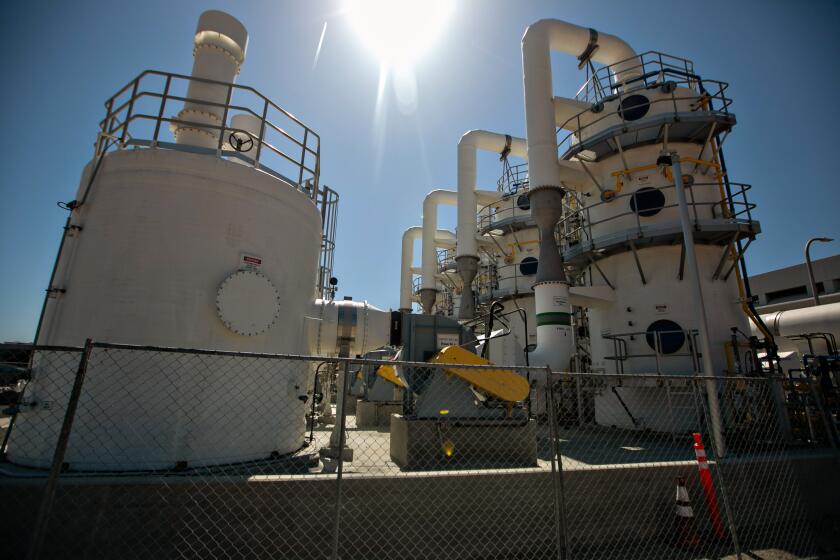Overseas Operations on Alert
Several American companies with large overseas operations are reevaluating their security procedures and in some cases temporarily closing offices, as they brace for potential reprisals against U.S. interests abroad after the attacks on Afghanistan.
Companies with major construction or infrastructure projects, such as pipelines or gas and oil facilities, are seen as particularly vulnerable because they employ thousands of workers in nations with large Muslim populations who might see the U.S. retaliation against Islamic militants in Afghanistan as an attack on Islam.
In Indonesia, where some Islamic groups have issued threats against the U.S., Unocal Corp., the El Segundo-based oil and gas exploration company, closed its office in Jakarta on Monday.
“It is part of our contingency program for these times. We continue to monitor the situation,” said Barry Lane, a Unocal spokesman. The office was expected to reopen today.
Lane said Unocal has about 1,300 employees in Indonesia, including 100 Americans.
Irving, Texas-based Exxon Mobil Corp. on Monday also closed its 400-employee office in Jakarta as a precaution.
Indonesia is the world’s most populous Muslim country. The U.S. Embassy in Jakarta warned companies to close their offices because they could become the focus of anti-U.S. street demonstrations.
Ongoing threats there and elsewhere have prompted multinational companies to act cautiously. Unocal is allowing only essential international travel and is on a security alert in sensitive areas, including its oil and gas facilities in Bangladesh, another Muslim country.
Other companies also have put their far-flung offices on alert.
“After the Sept. 11 attack, we heightened security measures, but we don’t disclose what we are doing,” said Fred Gorell, spokesman for San Francisco-based Chevron Corp.
Fluor Corp., the Aliso Viejo engineering and construction company with oil field projects in Saudi Arabia, said its security department is getting updates on tensions in the region from the U.S. government.
“Our office in Saudi Arabia is open . . . but certainly it is one of the places we are watching closely,” said Lisa Boyette, a Fluor spokeswoman.
“The projects we are working on are not necessarily high-profile,” Boyette said, “but if things get worse we are prepared to pull our employees.”
Fluor, which has long done business in the tense Middle East, removed its name from its office years ago to lower its profile. “Our clients know where to find us,” Boyette said.
Removing signage from buildings, vehicles and other equipment in Muslim countries is a prudent policy considering the current tensions, said Andreas Carleton-Smith, vice president of operations for Control Risk Group, an international security consulting firm.
His company is advising corporate human resources departments to keep track of every employee traveling abroad and to have a way to contact them quickly.
Control Risk also is helping companies review their response plans to potential car, truck and briefcase bombings at or near their foreign offices.
Carleton-Smith said the greatest threats right now are to companies with operations in Pakistan and Yemen, where associates of alleged terrorist mastermind Osama bin Laden have operated previously. (There are no U.S. companies doing business in Afghanistan.)
Other countries where American businesses face risks are Israel, including the disputed Gaza and West Bank areas; Jordan; Kuwait; Lebanon; Saudi Arabia; Sudan; Tajikistan; and Uzbekistan, Carleton-Smith said.
Although Saudi Arabia is on the watch list of nearly every security firm, an American employee of the nation’s oil company, Saudi Aramco, said Monday that he had not seen an increase in tension.
Aramco, which employs hundreds of Americans and other foreigners, has not issued evacuation plans, and business is being conducted as usual, said the employee, who requested anonymity.
Nonetheless, reports last week of suspected terrorist plots in the Arab kingdom have made executives of Pasadena-based oil, chemical and gas equipment company Ameron International Corp. nervous.
The company is having second thoughts about sending employees to a board of directors meeting next month in Saudi Arabia for several business ventures there.
“We are taking a wait-and-see attitude before deciding if we are going to send our people,” said James Marlen, Ameron’s chief executive.
*
Bloomberg News was used in compiling this report.
More to Read
Start your day right
Sign up for Essential California for news, features and recommendations from the L.A. Times and beyond in your inbox six days a week.
You may occasionally receive promotional content from the Los Angeles Times.







